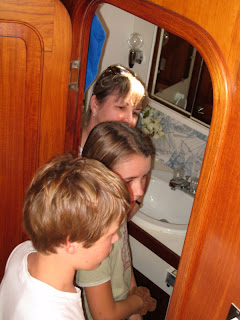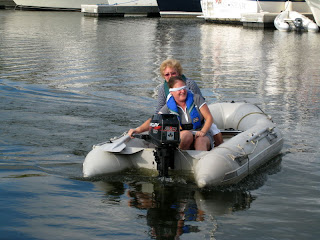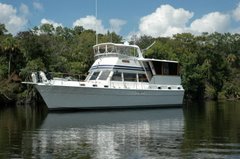This will be a rather long posting since we have not had good connections for internet and we have been running down the rivers to get to the place Ed Miller on "Miller Time" called the "Promised Land", the Cumberland and Tennessee rivers.
We left the wall at Joliet after many days of discussions about the river levels and headed down the Illinois river. There were seven boats leaving at the same time. We headed out into the river and formed into what looked like a navy convoy.

The group had various destinations planned for the first day and we headed down the river to Starved Rock Marina. The next day we headed out into the fog making our way through the final lock we would actually use on the Illinois. While we waited for the lock, some other boats came out of the fog bank to where we were.

We pulled off the lock wall and into the swollen waters of the river. Prior to this point the locks contolled the level of the water. Since this was the last lock, the river was in its natural state below this point.

We could look at the trees along the sides of the river and easily see where the water level had been only days before (the lighter colored leaves). The level was still flood stage and the next lock was almost completely under water as we just drove over the lowered dam. We had more debris with us and even had turtles riding the logs downstream. The debris would catch against anything structural and we just hoped that this would not all release with the next rain and come down on us at our next stop.




We stopped at Tall Timbers marina and met two other boats that had left the wall in Joliet before us. We all left the next morning to go to Grafton Marina at the confluence of the Illinois and Mississippi rivers. It started raining again and we stayed at Grafton for three days trying to make a decision about leaving. There were quite a few boats at Grafton and also at Alton marina a few miles down the Mississippi. We had meetings to discuss the situation and morning radio conferences.

We finally decided to leave on the 7th and were headed toward Hoppie's on the Mississippi. Hoppies is a favorite stop and one of only a few stops along the Mississippi.

We had talked with Hoppie's and they thought they could handle all of us if a boat left there that morning. We decided to go for it and headed out into the Mississippi.

The current was running much faster in the Mississippi and we were traveling at 13 to 14 miles per hour. We passed by St. Louis and the famous Arch along the way. Incredibly, there is no place to stop in St. Louis so we could only admire the arch as we passed by.


As we neared Hoppies, Stacy and I and Bill and Birute on B& B decided to make a longer day and go to Kaskaskia lock to tie up for the night. The Kaskaskia river joins the Mississippi about halfway between the Illinois and the Ohio. There is a lock about half a mile up the river and the lock allows boats to tie to the back of the lower wall. We had a good night there and then made another long day trip to the Ohio river. We anchored at Angelo Towhead where the Mississippi and Ohio join.

After a relatively quiet night we headed out in the morning for our run up the Ohio River. The weather was not cooperative and we had rain off and on all day. The Ohio runs into the Mississippi so we would be working against the current. The water levels in the Ohio had been reduced so the current was not nearly as strong as it could have been. There were two locks on the Ohio and the first had the wicket dam down so that we could just cross over the dam.

The second lock had many tows (barge groups being pushed up and down the river) waiting and we thought that there could be a long delay in the locking. On the Mississippi and Ohio we were seeing larger tows than previously. The largest we saw was 6 by 6 for a total of 36 barges. This one is a 5 by 5.

This would not be good as we had no alternative and must make the Cumberland Towhead by dark. It turned out that the water level had been dropped so much that most of the tows could not be locked without hitting the underwater sill of the lock. We were able to get right in the lock but it was the slowest lock we had been through. After we were finally up (standing in the rain the whole time), the doors to the lock would not open. The lock tenders had to run up to another building and start a standby generator as the power to the lock and local area had gone out. After a cloud of smoke that we assumed was the exhaust and not a fire, the lock tender came out of his shack and kicked at something on the doors and they started opening. The low water here turned out to be a blessing as boats a couple of days later were waiting for hours to be locked through due to all the higher priority tow traffic.
After the final lock we headed to the Cumberland Towhead. We anchored there for the night and then the next morning headed up the Cumberland River to Green Turtle Bay marina. We had to go through the Barkley Lock into the Barkley Lake and when we exited the lock we realized we had reached the "Promised Land". The scenery had changed and the water was much cleaner. We stayed at Green Turtle Bay for 3 days as we rested after our trip on the rivers. We were joined that day and the next day by most of the boats we were with on the wall at Joliet. We got together and celebrated our arrival in the Land Between The Lakes.


After three days we headed out from Green Turtle Bay. This is the place where many people were staying for a week or more to travel back home or take care of needed repairs. We worked on B & B's dinghy davit motor while we had a decent Ship's Store available.

One other boat, "September Morn" joined with us and B & B and we headed out to cross over to the Tennessee river and up to Joe Wheeler State Park in Alabama.
We all three anchored in a cove off the lake. Actually, we dropped our anchor and the other two boats rafted to us. We stayed here for two nights.

While we were there we swam in the warmer water and I dove down to check our zincs and running gear. I also checked September Morn's bow thruster for damage after he caught a stick in it during locking.

SEASEA and September Morn left after two nights and headed further up the river. B & B are not planning to go to the rendezvous at Joe Wheeler so they wanted to stay in the lakes for a few more days before heading out. We once again had to say goodbye to friends we had made. We hope to see them again sometime. They untied from us and we waved our farewells.

We stopped at Pebble Isle marina to pick up some fuel and spent the night there. The next night we headed on up the river and after anchoring behind an island on the river that night we headed for the split between the Tennessee river and the Tennessee-Tombigbee waterway that connects the Tennessee to Mobile Bay. September Morn planned to go to a marina just south of the split and we were headed to Joe Wheeler on the Tennessee so we said goodbye at the split and will see them again at the rendezvous in a few weeks. We could tell that we had been traveling between Kentucky and Tennessee by the turf war being waged on the river.

We traveled through two more locks and into the lakes of the Tennessee. These are beautiful lakes that remind us of Lake Burton in North Georgia except we don't have tows in Lake Burton. We had beautiful and peaceful anchorages and were able to watch a sternwheeler go by our selected cove on the lake.



On Tuesday the 18th we left our anchorage looking forward to entering the highest lock we will go through. The Wilson lock lifts us 90 something feet and is mighty impressive when entering. We tie to floating bollards that are in the sides of the lock and then hold the boat against the wall as the water level is raised in the lock chamber. The bollards float up slots in the wall so it is not extremely difficult to hold position. Leaving this lock put us out onto Wheeler Lake.





Just before entering the lock we passed by a unique bridge. This is what remains of a double deck bridge built in the early 1800's. It originally was built for train traffic on the upper deck and pedestrian, horse and wagon traffic on the lower deck. It is obviously no longer used but is historically interesting.

The Tennessee river is a series of lakes formed by the dams and locks. These lakes have many fine homes along the shores. Since this is mountainous terrain, the houses are usually high on bluffs overlooking the lake. We saw quite a few interesting methods for the occupants to get from the house to the lake. Everything from long stairs to rail cars and this one dock elevator.

We anchored in a cove close to Joe Wheeler State Park so that we could time our month slip rental beginning on Wednesday. These small coves are great anchorages. It still gives me pause when I see a large tow working in what appears to be a recreational lake. This one came right by the entrance to our cove.

Wednesday September 18 we pulled into Joe Wheeler State Park where SEASEA will stay for a month.

We will be leaving here on Saturday by car to go by Chattanooga then to Athens for a visit before coming back to Wheeler State Park for the America's Great Loop Cruisers Association rendezvous in mid-October. After that we will be taking the boat on up the Tennessee river to her permanent home.



















































































